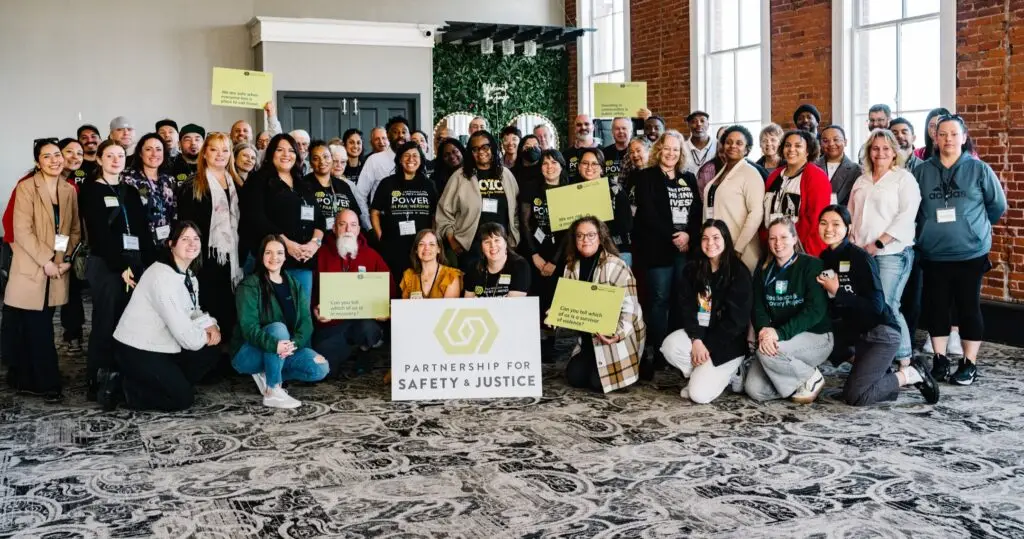2025 Legislative Wrap-up

Advocates from around the state gathered for Safety and Justice Advocacy Day in Salem to learn, network, and have impactful meetings with lawmakers.
During this legislative session, our aim was to find common ground on reforms after tough losses last year. Coming off the legislature’s recriminalization of drug possession (HB 4002, 2024), we knew we were entering a tough environment for the issues we care about most: ending mass incarceration and racial disparities, while building solutions that center people’s humanity.
Many of you advocated for our shared goals this year by reaching out to your elected officials – in person and through email. Together, you sent close to 400 emails to our elected leaders, and PSJ hosted two advocacy days, bringing nearly 100 advocates to the Oregon State Capitol to share their personal stories with legislators.
Your voices were heard, and we made a difference!
We had three priorities this session: renewing the Family Sentencing Alterative Program, securing funding for the Justice Reinvestment Equity Program, and preserving M110 funding.
Here’s what happened:
The Family Sentencing Alternative Program (FSAP) is now permanent.
The Family Sentencing Alternative (FSAP) passed nearly unanimously and was funded at $2.7 million through HB 2555! FSAP, which allows parents to be diverted into supervision instead of prison for certain offenses, received bipartisan support in both the House and Senate.
The program, which was set to sunset this year, is now permanent and can continue to reach a greater number of people in the counties where it is being implemented: Multnomah, Columbia, Lane, Jackson and Marion. The program now also ensures that culturally specific services are available when needed.
The bill was championed by Representative Travis Nelson and co-sponsored by many other legislators. We were thrilled to see it pass with such strong support!
For the past 10 years, FSAP has helped reduce unnecessary parental incarceration and has shrunk the amount of time children spend in foster care. With your support, the expanded program will continue to ensure accountability while keeping families intact.
Justice Reinvestment Equity Program
Despite JREP’s inclusion in the Governor’s budget; being on the BIPOC caucus’ priority agenda; and having 17 legislative sponsors, numerous organizational supporters, and two advocacy days, legislators chose not to provide funding for this groundbreaking program.
Our hearts are broken, but our spirits are not. We will continue to fight to fund this important program and the great service providers it supports.
It’s difficult to know exactly why JREP funding wasn’t renewed. We do know the state budget was smaller than hoped for, and many programs didn’t get anticipated funding. We knew that programs that serve Black and brown communities were the most vulnerable to cuts and are deeply disappointed that that this critical funding didn’t pass. The communities that have already suffered the most are once again underserved.
Through JREP, eighteen organizations across Oregon were advancing three critical goals: reducing incarceration and racial disparities, promoting healing, and ensuring community safety for all Oregonians. This fund, managed by the Northwest Health Foundation, has changed lives across the state.
The fight for JREP funding is not over – we are looking at all our options to keep JREP afloat. In the meantime, you can learn more about the JREP funded programs on the Northwest Health Foundation’s website.
Measure 110 Behavioral Health Funding
When HB 4002 (2024) rolled back drug decriminalization, it left critical funding for services in place. This session, there were threats to that funding. Through advocacy by many organizations, we were able to keep that funding intact. Further, HB 3069 passed this session and aims to create greater accountability for “deflection.” We are hopeful it will create greater accountability for the funds committed to keeping people out of the system.
A recent article in The Guardian, Revealed: Oregon spent funds meant for addiction services on prosecutors and police gadgets, uncovered how some counties are misusing deflection resources. Our own Andy Ko was quoted in the article,
“To keep more people alive, we have to act differently,” he said. “This is supposed to be about helping people through a crisis. That’s what the public wants. If we keep doing the same thing we’ve been doing for 60, 70 years, we’re going to get the same result.
We’ll be tracking implementation to HB 3069 and will continue to advocate in the spirit of M110 – that people struggling with substance use get the care and services they need, not jail.
This past year has given us the opportunity to do what we do best – build partnerships with unlikely allies, ensure that the policies we help pass are implemented well, and create spaces where people who have experienced so much systemic harm turn their pain into power. As Partnership for Safety and Justice enters its 27th year, we’ll continue to fight for safe and strong communities rooted in healing and justice. We hope you’ll join us.
